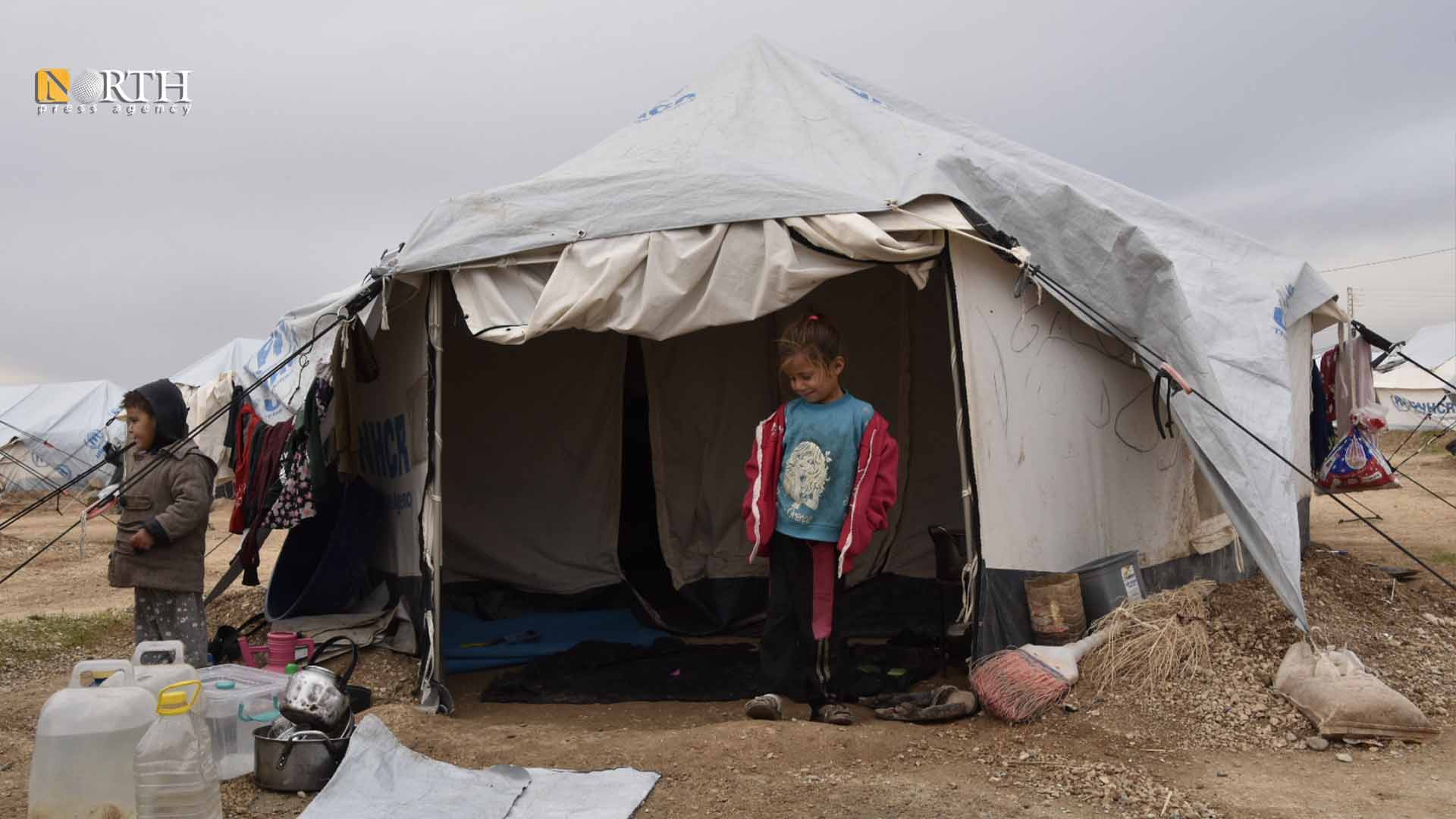
DERIK, Syria (North Press) – Bisan al-Hamad, a displaced woman from Sere Kaniye (Ras al-Ain) countryside in Newroz camp in the countryside of Derik, in the far northeastern Syria, is trying to install the bases of her tent, in an attempt to prevent the cold air from entering it.
Even the children and the elderly here in Newroz camp do not have warm clothes in the tents, most of which have no heaters this winter.
They fear that the tents will be filled with mud if it rains, because they are set up on a soft ground.
Many IDPs here say their children have recently got chest diseases and a cold due to the cold weather, and the inability of their parents to buy clothes or secure heaters and heating fuel, in light of the failure of the international relief efforts to reach the camp.
Al-Hamd added that only women’s coats, that are not thick and do not protect them from the cold, were distributed.
When the cold is intensifying, al-Hamad lightens the kerosene stove for cooking to get even a little warmth, despite the suffocating smell of kerosene amid the humidity.
Insufficient aid
Newroz camp, which was reopened during the Turkish invasion on Sere Kaniye and Tel Abyad in 2019, includes 885 families, in total of 4,553 persons.
The camp was established in 2014 with the aim of sheltering families fleeing from Sinjar district (Shingal), northern Iraq, after the Islamic State (ISIS) attacks.
Due to the recent Turkish invasions on the countryside of Tel Tamr town, north of Hasakah, dozens of families have been displaced to the camp amid a lack of humanitarian aid distributed by organizations.
The camp Relations Official said the number of the IDPs could increase, because some families displaced to the vicinity of their villages, hoping to return to them, head to the camps due to the frequent Turkish bombardment in the northern countryside of Hasakah.
The organizations operating in the camp do not provide sufficient support to the displaced due to the closure of al-Ya’rubiyah crossing, which causes delays and insufficient aid, he added to North Press.
One of the organizations distributed heaters to some of the displaced without securing heating fuel, while others have not received anything so far, according to the camp administration, which says that it has received promises from CARE organization to distribute winter clothes, but this has not been confirmed so far.
Tel Kocher (al-Ya’rubiyah) crossing, eastern Syria, has been closed to UN humanitarian access to northeastern Syria since 2020 due to a veto used by Russia and China, which exacerbated the challenges facing the region.
This has reduced the ability of relief organizations to support the ravaged health care system there and respond to the COVID-19 pandemic, according to Human Rights Watch.
Activists and workers in local organizations estimate that the closure of al-Ya’rubiyah humanitarian crossing has affected about two million displaced people and low-income residents in northern and eastern Syria.
Despite calls by organizations and member states of the United Nations for re-authorization of the crossing, the repeated Russian-Chinese veto led to rejection of the proposal, even before voting.
Ongoing suspension of the UN mandate
Local officials responsible for IDPs and camps in Syria’s northeast said depriving those who fled the Turkish invasions of humanitarian aid and the ongoing suspension of the UN mandate on aid access through Tel Kocher crossing is due to the use of the relief issue as a political card against the Autonomous Administration of North and East Syria (AANES).
Therefore, the vulnerable have been kept in mercy of the government will and policy through selecting projects and imposing conditions for partnership with local bodies linked to the Syrian security services, the AANES said in a statement in August.
Aisha Ahmad, her husband and her seven children live in a tent that lacks basic necessities of life. She received one single food basket every month.
“Such a basket is not sufficient to a 9-member family. Our living condition is extremely difficult,” she said desperately.
Ahmad and her family displaced Soker al-Lahima area, Tel Tamr, and moved to Newroz Camp months ago due to Turkish shelling.
Her children do not get shower frequently as she fears they will get sick. The tent has no kerosene stove and not enough blankets.
